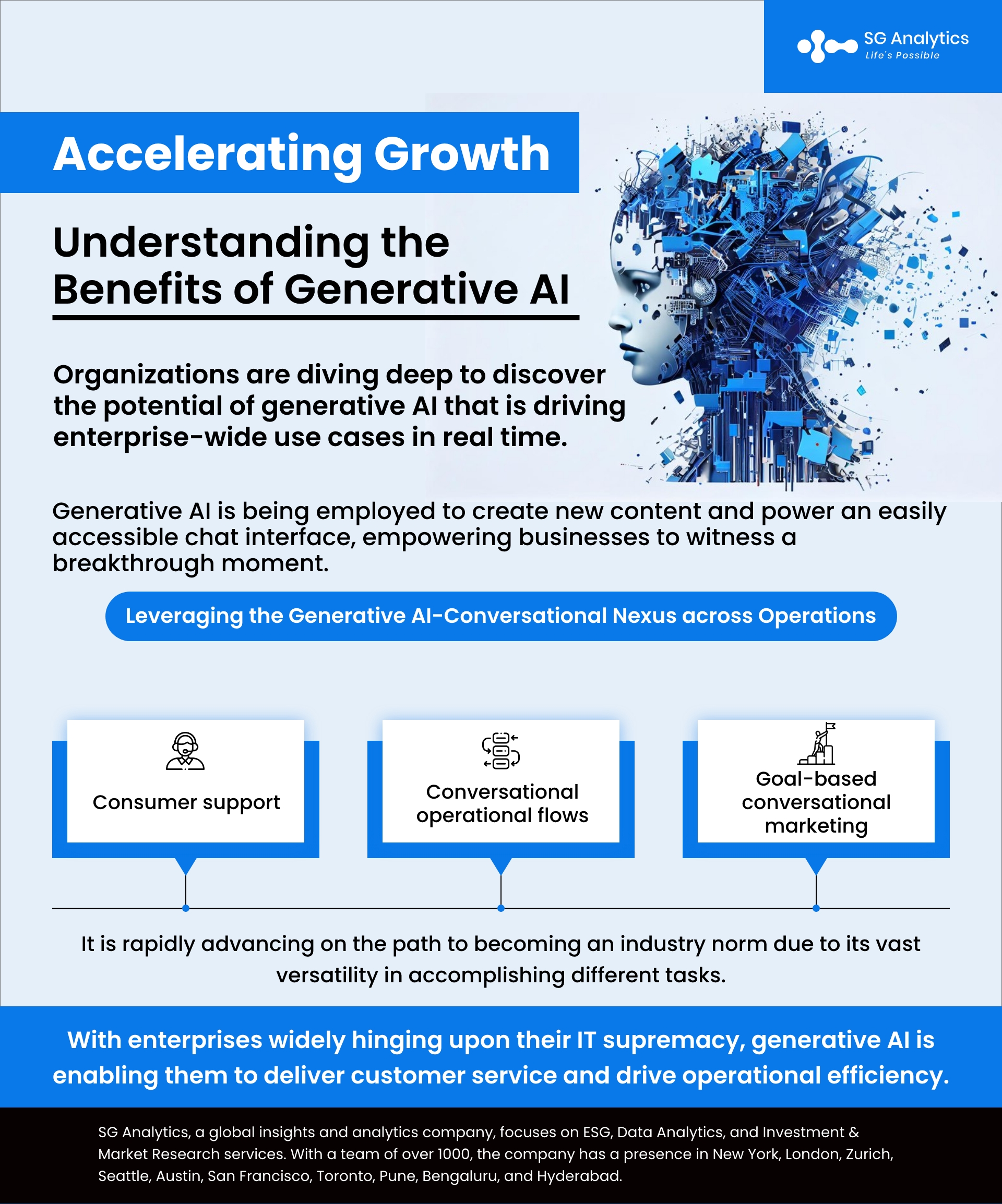The global market is evolving faster than ever, and businesses are feeling the need to adapt quickly to emerging trends to stay relevant and competitive. One of the most significant challenges they are facing is the need to develop their employees continuously.
A subset of artificial intelligence, Generative AI, is being employed to create new content in the form of text, voice, images, videos, and processes. Generative AI is powering an easily accessible chat interface, empowering businesses to witness a breakthrough moment. Businesses and research organizations are experimenting with Generative AI and paying close attention to exploring its potential capabilities and implications.
Let's uncover the potential of generative AI for enterprises.
Read more: The Role of Artificial Intelligence in Achieving Sustainability and Profitability

Leveraging the Generative AI-Conversational Nexus across Operations
Generative AI is enabling organizations to create flexible and adaptable conversational systems that understand and learn from interactions with users and enhance over time.
Conversational AI systems use language models such as BERT, GPT-2, GPT-3, and GPT-4 to understand conversations and assist enterprises with advanced capabilities and outcomes. The recent developments in large language models (LLMs) have also portrayed that these systems are equally capable of generating human-like text.
The enterprise adoption of generative Ai is expected to grow in the near future. However, to integrate generative AI in conversational operations, developers need to fine-tune the existing framework by employing proprietary enterprise as well as domain data. This is helping to significantly reduce the cost of generating interactive text, authorizing enterprises to dynamically create multiple versions of the text to convey the same information.
By leveraging learning, businesses can optimize these variants and enhance their conversion rates. This approach is further equipping them to create dynamic content for a comprehensive experience. Some prominent enterprise use cases where generative AI is assisting in enhancing the capabilities of conversational systems are as follows:
-
Consumer Support: Customer support teams can integrate conversational AI systems to identify as well as understand customer issues faster. With ticket summarization powered by generative AI, they can resolve them as well. The systems will also help in gaining context and the status of a query without the customer having to explain the problem multiple times. It will also further help frame the response tone that suits the context of the query. Organizations can address the submitted queries in languages unknown to them by using generative AI’s power to translate in real time.

-
Conversational Operational Flows: Generative AI is assisting organizations in creating responses automatically. The responses require human intervention only to review and streamline the output. While designing a conversation, a conversational AI system offers suggestions depending on industry-specific use cases. It also makes suggestions based on the next probable flow and alerts. A generative AI system can automatically suggest use cases. It can also auto-suggest the inputs required from the customer.
-
Goal-Based Conversational Marketing: The conversational AI systems can be leveraged to design omnichannel as well as goal-oriented marketing campaigns. With generative AI, organizations can define nuanced goals like special promotions to re-engaging with inactive customers. They can also provide specific instructions for customers to convince them to make a purchase or suggest the customer try a product that is targeted and relevant offers. This will further help enterprises to design a dynamic and hyper-personalized marketing campaign strategy.
Read more: Artificial Intelligence (AI): The Next Frontier for Product Innovation
Generating ROI with Generative AI
Today conversational AI has come a long way as users are easing up to the idea of interacting with a chatbot for their queries.

With the technology further adding new and highly intuitive features, dynamic AI agents are becoming more human-like and accurate in their responses. These are being integrated across a wide range of applications - from customer operations to marketing and personal assistants.
However, with these significant advancements, there is still room for innovation and enhancement. This helps establish the convergence between generative AI and conversational AI. The systems are helping to pave the way for the development of highly advanced and dynamic AI agents.
Businesses are integrating Generative AI for further benefit. However, it can be conceived along two distinct approaches.
-
The first one involves using available models with a simple interface to provide near-direct access to the underlying framework in the form of a text or an image generation tool.
-
The second approach includes integrating Generative AI with other tech innovations to automate operational processes. With Generative AI, businesses can undertake human-level expressive interactions while controlling the flow and ensuring factual accuracy.

Generative AI is competent to generate new data by identifying patterns in existing data. Conversational AI involves using machine learning algorithms to create natural language responses to user queries. The use of generative AI in conversational AI systems is further opening new avenues for improving customer experiences, thereby increasing productivity and driving actionable results.
Read more: Artificial Intelligence and the Downsides of AI Data Collection
Tips for Enterprises to Incorporate Generative AI
Conversational and generative AI is transforming operational development by presenting innovative ways to create personalized training and feedback framework. By providing organizations with real-time feedback, personalized content, and engaging learning experience, the systems are helping in building and fostering a skilled and motivated workforce. It also equips them to navigate the challenges of the modern workplace.
As the market landscape continues to evolve, businesses are adapting to the changing conditions, and conversational and generative AI is playing an increasingly vital role in shaping the future of work.
Enterprises scrutinizing the implementation of Generative AI into their conversational systems across different areas like customer support, customer engagement, and marketing should consider the following broad aspects:
-
It is vital for enterprises to determine the specific problem they want to resolve with generative AI, which involves identifying and understanding the business objectives along with the end-user needs.

-
Enterprises should partner with an automation partner that offers them guidance on the right technology and team expertise on this journey. It is equally important for them to ask vendors about their expertise along with the set goals outlined.
-
Enterprises need to design a plan to integrate ethical as well as responsible AI for operations like regular auditing, testing, and validation of generative models, thus ensuring transparency.
By developing a strong framework, enterprises can integrate generative AI and elevate their customer experiences by offering them personalized interactions. They can also employ potential use cases within their operations to follow emerging trends. With generative models continuing to evolve, organizations are becoming better at understanding the nuances of customer conversation by gaining relevant and useful insights.
Read more: Designing an Effective Data Storage and Management Culture to Simplify Technology Mix
Final Thoughts
The AI field is taking a turn with the release of powerful generative artificial intelligence (AI) models, and the world is witnessing the automation of some skills, including creativity and imagination. For some organizations, Generative AI holds the potential for higher-order opportunities, including the introduction of new services and business frameworks. Generative AI is also capturing the attention of global media and the public square, thus provoking questions and discussions around this technology.

Generative AI is rapidly advancing on the path to becoming an industry norm due to its vast versatility in accomplishing different tasks. Organizations are further diving deep to discover the potential of generative AI that is driving enterprise-wide use cases in real-time.
However, it is important to significantly pinpoint how effectively generative AI is supporting enterprises with service management. With enterprises widely hinging upon their IT supremacy, generative AI is enabling them to deliver customer service and drive operational efficiency.
With a presence in New York, San Francisco, Austin, Seattle, Toronto, London, Zurich, Pune, Bengaluru, and Hyderabad, SG Analytics, a pioneer in Research and Analytics, offers tailor-made services to enterprises worldwide.
A leader in the Technology domain, SG Analytics partners with global technology enterprises across market research and scalable analytics. Contact us today if you are in search of combining market research, analytics, and technology capabilities to design compelling business outcomes driven by technology.









